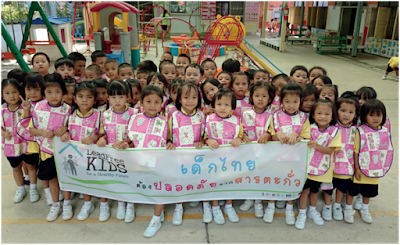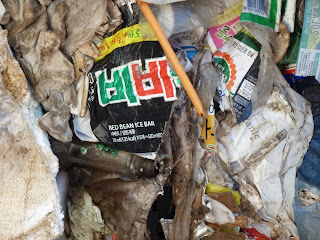PH NGO Lauds Thai Government for Issuing Lead Paint Regulation
The EcoWaste
Coalition, an environmental and health watchdog group in the Philippines, has
lauded the government of Thailand for issuing a mandatory regulation in enamel
paints that will protect children in Thailand and the ASEAN region against lead
exposure.
Effective January 2017, all enamel paints used for construction and decorative
purposes which are manufactured or sold in Thailand must contain no more than
0.01 % (or 100 parts per million) lead, mercury and cadmium in dry weight, and must not exceed 0.1% (1,000 ppm)
hexavalent chromium (dry weight).
In addition, all enamel paints manufactured or sold in Thailand will be
required to show a warning label about potential dangers from the product, for
example, “contains toxic substance” or “keep away from children.”
“We consider this a very important step in pushing for health-protective
regulation in paints as countries in the ASEAN region move towards increased
economic cooperation and integration,” declared Sonia Mendoza, President,
EcoWaste Coalition.
“We congratulate the Thai authorities for taking action and commend the civil
society campaign led by the Ecological Recovery and Alert-Thailand (EARTH) for
their dynamic advocacy to make this happen with support from various
collaborators,” she said.
“Our steadfast multi-stakeholder effort in the Philippines to regulate lead in
paints could have possibly encouraged Thailand to switch from voluntary to mandatory
regulation,” she noted.
The Thai Department of Foreign Trade in February 2015 issued a statement
alerting Thai manufacturers that “the Philippines values public health and
safety” and that Thai paint manufacturers “should continuously improve the
quality of their products” because Thailand exports as much as 616 million baht
in paint products and varnishes to the Philippines each year, the EcoWaste
Coalition recalled.
The DENR A.O. 2013-24 signed by Environment and Natural Resources Secretary
Ramon J.P. Paje provides for a 90 ppm limit for lead in paint and establishes a
phase out period for leaded architectural, decorative and household paints by
January 2017, and leaded industrial paints by January 2019.
“We hope other ASEAN countries will decisively
act and follow suit to ensure that paints produced, traded, sold and used in
the region are safe from toxic lead, which can cause serious harm, especially
to young children,” Mendoza said.
According to the World Health Organization (WHO), “lead is a cumulative
toxicant that has harmful effects on multiple body systems” and that “there is no
known level of lead exposure that is considered safe, ” especially for the
unborn babies and young children.
Out of the 10 member states and two observer states of the ASEAN, only three –
Philippines, Singapore and Thailand – have regulations controlling lead in
paints, particularly oil-based decorative paints.
“The Thai regulation will be beneficial for children in other countries because
many Thailand-based manufacturers are major exporters of
paint products, particularly in the ASEAN region,” stated Penchom Saetang, Director, EARTH.
“We hope that all manufacturers will comply with this new regulation to reduce
the future burden on public health from long-lasting environmental
contamination from leaded paint,” she said.
EARTH and the EcoWaste Coalition spearheaded the civil society campaign to get
lead out of paints in Thailand and the Philippines as part of the IPEN Asian
Lead Paint Elimination Project assisted by the European Union.
EARTH and the EcoWaste Coalition are contributing members of GAELP, a
cooperative initiative led by the United Nations Environment Programme and WHO,
and are members as well of IPEN, a global civil society organization promoting
safe chemicals policies and practices that protect human health and the
environment.
-end-
Original documents in Thai language:
January 29, 2016 - “Administrative Decree Requiring Alkyd
Enamel Paints to Meet Industrial Product Standards” http://www.ratchakitcha.soc.go.th/DATA/PDF/2559/A/010/11.PDF. This
national legislation refers to technical requirements specified in “Thai
Industrial Standards No. 2625-2557: Safety Standard for Alkyd Enamel Paints” http://app.tisi.go.th/standard/fulltext/TIS-2625-2557.pdf
http://ipen.org/sites/default/files/documents/National_Report_Lead_In_New_Enamel_Paints_in_Thailand_June_2015.pdf
(please turn to page 18, last paragraph, to see the quote from the Thai
Department of Foreign Trade)





Comments